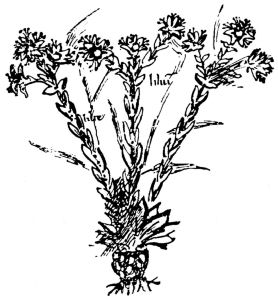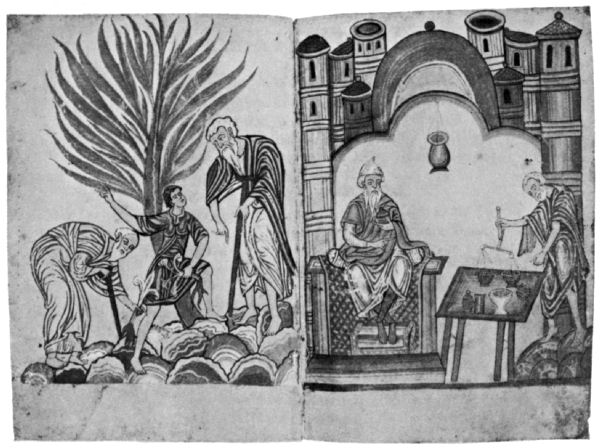Transcriber's Note
This text uses some uncommon characters, in particular yogh (ȝ),apostrophus (Ɔ) and y, m and n with a macron (ȳ, m̄ and n̄respectively). There are also some astronomical symbols (♄, ♃, ♂,⊙, ♀, ☿, ☽). If these do not display correctly, you may needto adjust your browser settings.
There is also some Greek text, e.g.Περὶ Διδαξέων.A transliteration is included, and is indicated with a faint dotted red underline;hover your mouse over the word(s) to see it.
Tironian ampersands are indicated as [et]. A q with a small c above isindicated as [qui].
THE OLD
ENGLISH HERBALS
BY
ELEANOUR SINCLAIR ROHDE
AUTHOR OF “A GARDEN OF HERBS”

Illustration of the “lilie” from the Saxontranslation of the Herbarium of Apuleius
Longmans, Green and Co.
1922
HERBS BEING DUG UP AND MADE INTO MEDICINES UNDERTHE DIRECTION OF A SAGE
From a 12th century copy of the Herbarium of Apuleius, now in the Libraryof Eton College
TO
MY BROTHER
“The Lely is an herbe wyth a whytefloure. And though the levys of the flourebe whyte: yet wythin shyneth the lykenesseof golde.”—Bartholomæus Anglicus(circ. 1260).
PREFACE
The writing of this book on that fascinating and somewhatneglected[1] branch of garden literature—the old English Herbals—hasbeen a labour of love, but it could not have been donewithout all the kind help I have had. My grateful thanksare due to the authorities at the British Museum, to ProfessorBurkitt of Cambridge, and very specially to Mr. J. B. Capperfor invaluable help. I am indebted to Dr. James, the Provostof Eton, for his kind permission to reproduce an illustrationfrom a twelfth-century MS. in the Library of Eton College forthe frontispiece. I find it difficult to express either my indebtednessor my gratitude to Dr. and Mrs. Charles Singer, the formerfor all his help and the latter for her generous permission tomake use of her valuable bibliography of early scientific manuscripts.I am further indebted to Dr. Charles Singer for readingthe chapter on the Anglo-Saxon herbals in proof. For their kindcourtesy in answering my inquiries concerning the MS. herbalsin the libraries of their respective cathedrals, I offer my gratefulthanks to the Deans of Lincoln and Gloucester Cathedrals, andto the Rev. J. N. Needham for information concerning theherbals in the library of Durham Cathedral; to the librariansof the following colleges—All Souls’ College, Oxford; BalliolCollege, Oxford; Corpus Christi College, Oxford; CorpusChristi College, Cambridge; Emmanuel College, Cambridge;Gonville and Caius College, Cambridge; Magdalene College,Cambridge; Peterhouse, Cambridge; Jesus College, Cambridge;St. John’s College, Oxford, and Trinity Colle
